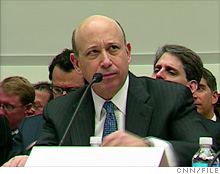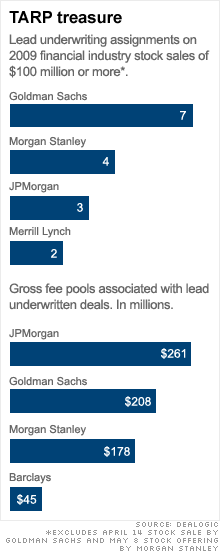The rich get richer on Wall Street
As more banks raise money to repay bailout loans, that means big fees for Goldman Sachs, JPMorgan Chase and Morgan Stanley.
 |
| Goldman Sachs, led by Lloyd Blankfein, is among the banks profiting from a rush to repay TARP funds. |

NEW YORK (Fortune) -- The rush to repay government bailout loans is fattening up what's left of Wall Street.
In the week since regulators revealed the results of the bank stress tests, half a dozen big financial firms have set plans to sell shares to raise new funds.
The banks that are raising capital are taking advantage of the recent financial sector rally. They are also bolstering their standing with investors, who would like to see them depart Treasury's Troubled Asset Relief Program.
And this urge to purge TARP funds is translating into rich underwriting fees for three big U.S. brokerage firms -- Goldman Sachs (GS, Fortune 500), Morgan Stanley (MS, Fortune 500) and the J.P. Morgan unit of JPMorgan Chase (JPM, Fortune 500) -- that are taking the lead in managing bank capital-raising efforts.
Goldman and Morgan served as co-managing underwriters of a $2.5 billion stock offer this week at U.S. Bancorp (USB, Fortune 500) and a $1.2 billion stock offering at Bank of New York Mellon (BK, Fortune 500). They were joined by J.P. Morgan in co-managing a $1.5 billion stock offer for BB&T (BBT, Fortune 500), which like U.S. Bancorp and Bank of New York Mellon passed the stress test but wants to repay TARP soon.
With underwriting fees ranging from 2.65% of proceeds in the U.S. Bancorp deal to 3% for the smaller Bank of New York Mellon and BB&T sales, the big Wall Street banks could book fees in the tens of millions of dollars. The fee pool, to be divvied up among the underwriters and other banks that help to sell shares in the three deals, totals $147 million, according to data from Dealogic.
But as active as Goldman and Morgan have been, they missed out on what has been the biggest U.S. stock offering of the year, Wells Fargo's (WFC, Fortune 500) $8.6 billion sale last Friday. That deal -- which promises $200 million in gross fees to underwriting banks, according to Dealogic -- is being co-managed by J.P. Morgan and Wells' Wachovia unit.
Still, with regulators having instructed 10 big banks to raise $75 billion in common equity, the banks will surely have more chances to score underwriting deals in coming weeks.
For instance, Morgan Stanley stands to make $10 million selling $750 million worth of stock for KeyCorp (KEY, Fortune 500), according to a sales agreement the Cleveland-based bank filed with regulators.
So this mini underwriting boon is another potential boost for Goldman Sachs, JPMorgan Chase and Morgan Stanley, banks that already were perceived by investors as being in better shape than other big rivals like Citigroup (C, Fortune 500) and Bank of America, for example.
Goldman and Chase don't have to raise more capital as a result of the stress tests, and both banks have indicated that they too are eager to pay back TARP funds soon.
Morgan Stanley was found to need $1.8 billion in new capital, but it has already announced plans to sell $4 billion in stock and another $4 billion in bonds.
Still, while Goldman, Morgan Stanley and J.P. Morgan have been the most active managers, they haven't been the only ones. Barclays Capital (BCS) led a $1.6 billion sale of Capital One stock this week, and Bank of America's (BAC, Fortune 500) Merrill Lynch handled a $1 billion offering for Principal Financial (PFG, Fortune 500).
But even if the underwriting deals promise to help second-quarter profits for big financial firms somewhat, the investment banking business remains deeply depressed compared to the wheeling and dealing of the bubble years.
At Goldman, for instance, equity underwriting revenue fell 72% in the first quarter from a year ago, to just $48 million.
Barclays Capital analyst Roger Freeman wrote in a note to clients last month that the first quarter could have been the trough for Goldman's underwriting business.
Even so, he expects 2009 investment banking revenue at Goldman to drop 25% from a year ago, to $3.9 billion. That's also 49% below the division's peak revenue in 2007.
Investment bankers will continue to suffer as long as merger-and-acquisition activity remains weak, Goldberg wrote. And few observers expect to see a big pickup in takeovers until the economy really starts to recover. ![]()
-
 The retail giant tops the Fortune 500 for the second year in a row. Who else made the list? More
The retail giant tops the Fortune 500 for the second year in a row. Who else made the list? More -
 This group of companies is all about social networking to connect with their customers. More
This group of companies is all about social networking to connect with their customers. More -
 The fight over the cholesterol medication is keeping a generic version from hitting the market. More
The fight over the cholesterol medication is keeping a generic version from hitting the market. More -
 Bin Laden may be dead, but the terrorist group he led doesn't need his money. More
Bin Laden may be dead, but the terrorist group he led doesn't need his money. More -
 U.S. real estate might be a mess, but in other parts of the world, home prices are jumping. More
U.S. real estate might be a mess, but in other parts of the world, home prices are jumping. More -
 Libya's output is a fraction of global production, but it's crucial to the nation's economy. More
Libya's output is a fraction of global production, but it's crucial to the nation's economy. More -
 Once rates start to rise, things could get ugly fast for our neighbors to the north. More
Once rates start to rise, things could get ugly fast for our neighbors to the north. More







